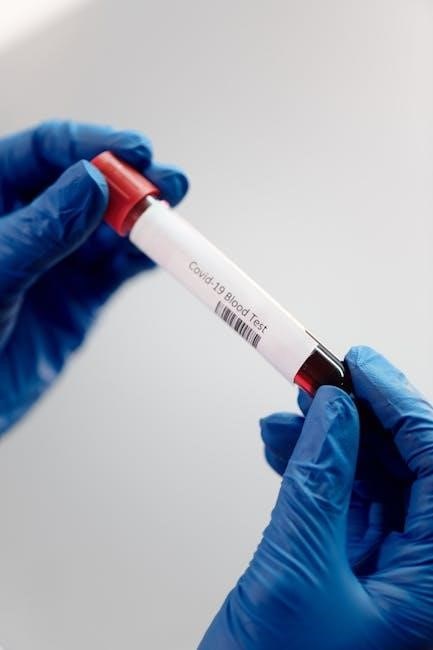Grade 7 Science Test with Answers PDF: A Comprehensive Guide
This guide provides a comprehensive overview of the Grade 7 Science Test, offering valuable insights for students and educators. It includes practice materials, effective strategies, and additional resources to help students prepare thoroughly, ensuring they feel confident and well-prepared for the test.
The Grade 7 Science Test is a benchmark assessment evaluating students’ understanding of fundamental scientific concepts. It covers biology, physics, chemistry, and environmental science, designed to measure knowledge and critical thinking. The test is structured to include multiple-choice and open-ended questions, providing a comprehensive evaluation of skills. Regular practice with sample questions helps build confidence and familiarity with the format.
1.1 Importance of Science Tests in Grade 7
Science tests in Grade 7 are crucial for assessing foundational knowledge and skills. They help students develop critical thinking, problem-solving, and analytical abilities. Regular testing also identifies learning gaps, allowing for timely intervention. Additionally, these tests prepare students for higher-grade challenges and foster a deeper understanding of scientific concepts, enhancing overall academic performance and confidence.
1.2 Structure of the Test
The Grade 7 Science test typically includes multiple-choice questions, short-answer sections, and open-ended problems. The test is divided into sections covering biology, physics, chemistry, and environmental science. Time limits and question distribution vary, but understanding the format helps students manage their time effectively and approach each section with confidence and clarity.
Key Concepts Covered in the Test
The test covers essential topics in biology, physics, chemistry, and environmental science, ensuring a well-rounded understanding of foundational scientific principles and concepts for Grade 7 students.
2.1 Cells and Biology
Grade 7 students will explore the fundamental structure and function of cells, including cell organelles like the nucleus, mitochondria, and ribosomes. They will learn about cell division, photosynthesis, and the role of cells in living organisms. Understanding cellular biology is crucial for grasping life processes and the human body’s basic functions, making it a cornerstone of science education at this level.
2.2 Basic Physics Concepts
Grade 7 students will explore foundational physics concepts, including motion, forces, and energy types, as well as simple machines and basic electricity. These topics introduce essential principles that explain how the physical world works and prepare students for advanced scientific studies. Understanding these basics helps in solving everyday problems and fostering a deeper appreciation for science.
This section covers basic chemistry concepts, including the periodic table, elements, compounds, and mixtures. Students learn about chemical reactions, states of matter, and the properties of materials. Understanding these fundamentals helps build a strong foundation for advanced chemistry topics and real-world applications in science and technology.
2.4 Environmental Science
This section explores key environmental concepts, including ecosystems, conservation, and human impact on the planet. Students learn about biodiversity, pollution, climate change, and sustainable practices. Practical examples and real-world applications help students understand the importance of environmental stewardship and its relevance to daily life and future challenges.

How to Prepare for the Test
This section outlines effective strategies to help students prepare for the test, including creating a study plan, understanding key concepts, and utilizing available resources efficiently.
3.1 Study Schedule and Timetable
Creating a structured study schedule and timetable is essential for effective preparation. Break down the syllabus into manageable parts, allocate specific times for each subject, and include regular breaks to maintain focus. Prioritize topics based on difficulty and ensure ample time for practice tests and reviews. A well-organized timetable helps cover all sections thoroughly, boosting confidence and performance.
3.2 Understanding Key Terms and Definitions
Mastering key terms and definitions is crucial for success in the Grade 7 Science Test. Create flashcards or lists of important vocabulary and review them regularly. Use textbooks, glossaries, or online resources to ensure clarity. Understanding these terms will help you interpret questions accurately and apply concepts effectively during the test. Consistent review strengthens retention and confidence.
3.3 Practicing with Sample Questions
Practicing with sample questions is an effective way to familiarize yourself with the test format and content. Use the Grade 7 Science Test with Answers PDF to identify your strengths and weaknesses. Regularly reviewing sample questions helps improve problem-solving skills and builds confidence. Ensure you understand the reasoning behind each answer to reinforce your learning and retention of key concepts.
Tips for Taking the Test
Effective test-taking strategies include managing your time wisely, staying calm, and thoroughly reading each question. Use the provided materials and review answers if time permits.
4.1 Time Management During the Test
Allocate time evenly to each section and question. Start with easier questions to secure marks quickly, then move to more challenging ones. Avoid spending too long on a single question. Use the remaining time to review your answers and ensure completeness. Proper time management reduces stress and improves overall performance.
4.2 Strategies for Multiple-Choice Questions
Read each question carefully and identify key terms. Eliminate clearly incorrect options first. If unsure, make an educated guess based on prior knowledge. Always attempt to answer, as unattempted questions earn no marks. Use process of elimination to increase chances of selecting the correct answer. Stay calm and manage time effectively.
4.3 Approaching Open-Ended Questions
Read the question carefully and ensure you fully understand what is being asked. Break down complex questions into simpler parts. Provide clear, concise explanations using scientific terminology where appropriate. Organize your answer logically, supporting it with relevant examples or diagrams. Plan your response briefly before writing to save time and ensure clarity. Review your answer for accuracy and completeness.

Sample Test Questions and Answers
This section provides a variety of sample questions and answers covering key topics in biology, physics, chemistry, and environmental science. These examples help students understand the test format and improve their problem-solving skills, ensuring they are well-prepared for the actual exam.
5.1 Biology Questions and Answers
This section focuses on biology-related questions, covering topics such as cells, ecosystems, and life processes. The questions are designed to assess students’ understanding of biological concepts and their ability to apply knowledge. Sample answers are provided to help students review and improve their grasp of key biology topics effectively.
5.2 Physics Questions and Answers
This section includes physics questions covering fundamental concepts such as motion, forces, energy, and simple machines. The questions are designed to test students’ understanding of basic physics principles and their application. Sample answers are provided to guide students in reviewing and improving their knowledge of key physics topics effectively.
5.3 Chemistry Questions and Answers
This section focuses on basic chemistry concepts, including elements, compounds, and chemical reactions. Sample questions and answers cover topics like the periodic table, mixtures, and simple chemical processes. These resources help students understand fundamental chemistry principles and prepare confidently for their Grade 7 science test with clear explanations and practical examples.
5.4 Environmental Science Questions and Answers
This section provides sample questions and answers on environmental science topics, such as ecosystems, conservation, and pollution. It covers key concepts like sustainability and the impact of human activities on the environment. These resources help students understand environmental principles and apply them to real-world scenarios, preparing them for the Grade 7 science test with confidence.

Reviewing and Analyzing Your Answers
Reviewing your answers helps identify mistakes, understand gaps in knowledge, and improve retention. Analyzing feedback from answer keys enhances learning and prepares you for future tests effectively.
6.1 Identifying Weak Areas
Reviewing your test answers helps pinpoint areas where you need improvement. Compare your responses with the answer key, note incorrect answers, and identify recurring mistakes. Assessing these patterns reveals gaps in your understanding, allowing you to focus on specific topics or concepts that require additional study and practice to strengthen your knowledge base.
6.2 Improving Your Understanding
Start by breaking down complex topics into simpler ideas. Use diagrams, videos, and practical examples to enhance comprehension. Regularly review challenging subjects and complete practice exercises to reinforce learning. Engage with study groups or seek guidance from teachers to clarify doubts, ensuring a solid grasp of key scientific concepts and principles.
Summarizing key concepts and staying confident are crucial. Use the test as a learning opportunity, and remember, consistent practice leads to achieving your academic goals successfully.
7.1 Staying Confident and Calm
Staying confident and calm during the test is essential for optimal performance. Practice deep breathing exercises, visualize success, and remind yourself of your preparation. Avoid overthinking and focus on answering questions methodically. Believe in your abilities and approach the test with a positive mindset to manage anxiety effectively and stay composed.
7.2 Using the Test as a Learning Tool
The test serves as an excellent learning opportunity. Reviewing answers helps identify weak areas, reinforcing concepts and clarifying doubts. Use the test to gain practical exam experience, analyze mistakes, and understand the format. This process enhances understanding, boosts retention, and prepares students for future assessments by addressing gaps in knowledge effectively.

Additional Resources for Preparation
This section highlights recommended textbooks, online study guides, and educational websites to supplement your preparation; Utilize these resources to deepen understanding and explore interactive learning materials effectively.
8.1 Recommended Textbooks and Guides
Popular textbooks such as Science Explorer and Grade 7 Science Workbook are highly recommended. These resources align with the curriculum, offering interactive activities, detailed explanations, and practice questions. Additionally, study guides like Science Made Easy provide focused concept reviews and sample test papers, catering to diverse learning needs and enhancing overall preparation.
8.2 Online Resources and Websites
Utilize online platforms like Khan Academy for video tutorials and Duolingo for interactive science lessons. Websites such as National Geographic Kids and BrainPOP offer engaging content and quizzes. CK-12 provides free textbooks and practice questions to reinforce learning.

Final Checklist Before the Test
Ensure you have all necessary materials, review notes, and stay calm. Double-check the test time, location, and required items like pens, a calculator, and a water bottle.
9.1 Materials to Bring
Ensure you bring pens, pencils, an eraser, a sharpener, a calculator, and a ruler. Organize your notes and any allowed reference materials.Pack extra supplies and a water bottle. Check school guidelines for any specific requirements to avoid last-minute issues.
9.2 Mental and Physical Preparation
Ensure adequate rest before the test to maintain focus. Practice relaxation techniques, such as deep breathing or meditation, to stay calm. Eat a nutritious meal and stay hydrated. Engage in light physical activity to boost energy levels. Arrive early to avoid stress and mentally prepare for the challenge ahead.

Frequently Asked Questions (FAQs)
This section addresses common questions about the test format, duration, and content. It also provides tips for tackling challenging questions, helping students feel more prepared and confident.
10.1 Common Questions About the Test Format
Students often ask about the test duration, question types, and weighting; The test typically includes multiple-choice and open-ended questions, covering biology, physics, chemistry, and environmental science. Time limits and formatting details are provided in advance to help students prepare effectively for the exam.
10.2 Tips for Handling Difficult Questions
When faced with challenging questions, read them carefully to ensure understanding. Eliminate obviously incorrect answers first, and make educated guesses if needed. Budget your time wisely, skipping tough questions initially and returning to them later. Stay calm, as panic can hinder problem-solving. Regular practice with sample questions can also improve confidence and accuracy.
Final Words of Encouragement
Believe in your abilities and stay confident. Remember, this test is just one step in your learning journey. Celebrate the effort you’ve put into preparation and approach the test with a positive mindset. Stay calm, think clearly, and trust your knowledge. Your hard work will shine through, and every question is an opportunity to showcase your understanding. Keep pushing forward and embrace the experience as a chance to grow.
